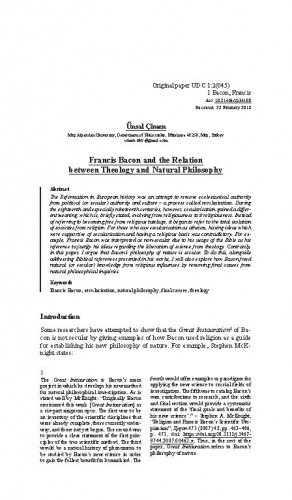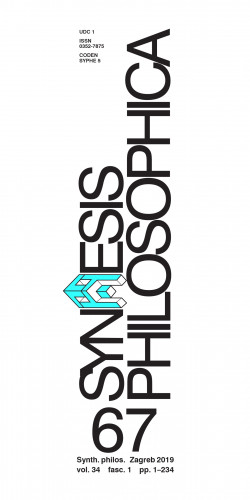The Reformation in European history was an attempt to remove ecclesiastical authority from political (or secular) authority and culture – a process called secularisation. During the eighteenth and especially nineteenth centuries, however, secularisation gained a different meaning, which is, briefly stated, evolving from religiousness to irreligiousness. Instead of referring to becoming free from religious tutelage, it began to refer to the total isolation of societies from religion. For those who saw secularisation as atheism, having ideas which were supportive of secularisation and having a religious basis was contradictory. For example, Francis Bacon was interpreted as non-secular due to his usage of the Bible as his reference to justify his ideas regarding the liberation of science from theology. Contrarily, in this paper, I argue that Bacon’s philosophy of nature is secular. To do this, alongside addressing Biblical references presented in his works, I will also explore how Bacon freed natural (or secular) knowledge from religious influences by removing final causes from natural philosophical inquiries.; U europskoj povijesti, Reformacija je bila pokušaj uklanjanja crkvenog autoriteta iz političkog (ili sekularnog) autoriteta i kulture – postupak koji nazivamo sekularizacija. Tijekom osamnaestog i napose devetnaestog stoljeća, sekularizacija je zadobila drugačije značenje koje, kratko rečeno, evoluira iz religioznosti u ireligioznost. Umjesto da se odnosi na postajanje slobodnim od crkvenog tutorstva, počelo se odnositi na potpunu izolaciju društva od religije. Za one koji su sekularizaciju vidjeli kao ateizam, istovremeno nositi sekularizacijske ideje i imati religijsku osnovu bilo je proturječno. Primjerice, Francis Bacon je interpretiran kao nesekularan zato što je koristio Bibliju kao izvor za opravdanje svojih ideja vezanih za oslobođenje znanosti od teologije. Suprotno tome, u ovom radu argumentiram da je Baconova prirodna filozofija sekularna. Da bih to dokazao, izuzev referiranja na biblijske izvore u njegovim radovima također ću istražiti kako je Bacon oslobodio prirodno (ili sekularno) znanje od religijskog utjecaja time što je uklonio konačne uzroke iz prirodofilozofskog ispitivanja.; Au fil de l’histoire européenne, la Réforme était une tentative d’éliminer l’autorité ecclésiastique de l’autorité et de la culture politique (ou laïque) – un processus appelé sécularisation. Au cours du XVIIIe siècle et surtout du XIXe siècle, la sécularisation acquit un sens différent, qui, brièvement dit, passe de la religion à l’irréligiosité. Au lieu de se référer à la libération de la tutelle religieuse, elle a commencé à se référer à une isolation absolue des sociétés de la religion. Pour ceux qui considéraient la sécularisation comme athéisme, avoir des idées favorables à la sécularisation et avoir une base religieuse était contradictoire. A titre d’exemple, Francis Bacon a été considéré comme non laïque en raison de son recours à la Bible comme référence pour justifier ses idées concernant la libération de la science de la théologie. Au contraire, dans cet article, je soutiens que la philosophie de la nature de Bacon est laïque. Afin de le démontrer, outre une étude des références bibliques présentées dans ses travaux, j’explorerai également comment Bacon a libéré le savoir naturel (ou laïc) d’influences religieuses en supprimant les causes finales des enquêtes philosophiques naturelles.; Die Reformation in der europäischen Geschichte war ein Versuch, die kirchliche Autorität von der politischen (oder säkularen) Autorität und Kultur zu entfernen – ein Prozess, der Säkularisierung genannt wird. Während des achtzehnten und insbesondere des neunzehnten Jahrhunderts erlangte die Säkularisierung jedoch eine andere Bedeutung, die sich, kurz gesagt, von Religiosität zu Irreligiösität entwickelt. Anstatt sich auf die Befreiung von religiöser Bevormundung zu beziehen, begann sie sich auf die völlige Isolation der Gesellschaften von der Religion zu konzentrieren. Für diejenigen, die Säkularisierung als Atheismus betrachteten, war es widersprüchlich, Ideen zu haben, die zugleich die Säkularisierung unterstützten und eine religiöse Grundlage hatten. Beispielshalber wurde Francis Bacon als nicht-säkular interpretiert, und zwar aufgrund seiner Verwendung der Bibel als Quelle, um seine Vorstellungen bezüglich der Befreiung der Wissenschaft von der Theologie zu rechtfertigen. Im Gegensatz dazu argumentiere ich in diesem Artikel, dass Bacons Naturphilosophie säkular ist. Um dies zu bekräftigen, werde ich abgesehen von der Adressierung der in seinen Werken vorgestellten biblischen Referenzen auch erforschen, wie Bacon natürliches (oder säkulares) Wissen von den religiösen Einflüssen befreite, indem er Endursachen aus naturphilosophischen Untersuchungen herausschnitt.
Sažetak

 Synthesis philosophica : 34,1(2019) / editor-in-chief Ante Čović.
Synthesis philosophica : 34,1(2019) / editor-in-chief Ante Čović.